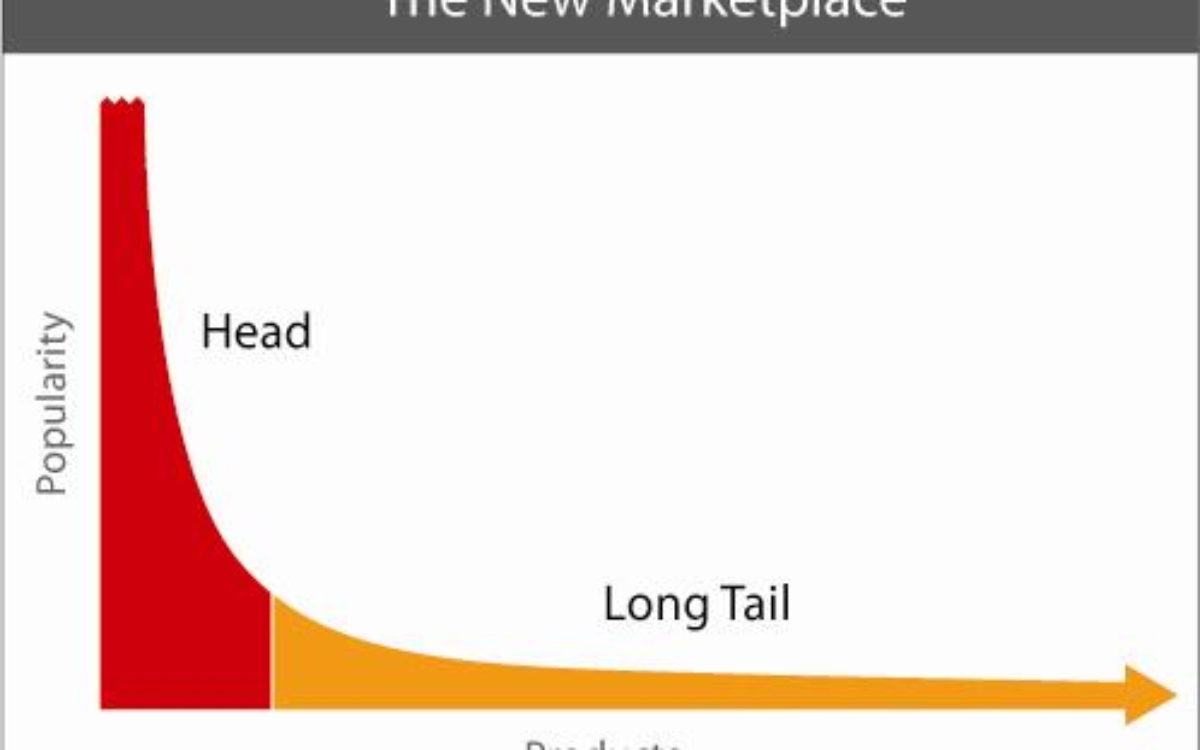What is a Long Tail Keyword?

When you buy something through one of the links on our site, we may earn an affiliate commission.
Today, I am doing something a little bit different. I thought I would bust out my wipe board and make a video on long tail keywords! I'm not sure exactly what prompted me to throw this video together, but I was in the moment and just went for it. So, I would appreciate any feedback as to whether or not you would like to see more or less of these types of videos.
Anyway, I did this impromptu discussion of what exactly a long tail keyword is because I still think there is a lot of confusion over what they are. And this is really a pretty critical factor as the entire theory of building and profiting from niche websites is based on this long tail theory. I have personally put a lot of time and research into understanding the importance of this theory - and so far its paid off nicely. Anyway, all of the text after the video here is the transcript of the video - so enjoy!
What is a Long Tail Keyword - Video
Transcript of the above video:
Hello - Spencer here with nichepursuits.com and I wanted to do something a little bit different today. I wanted to draw on the wipe board - The kids are a swim lessons and I have a quiet house! I thought I would discuss a couple of things. A lot of people talk abo.ut long tail keywords all the time, and I think there is a lot of misconceptions about what long tail keyword is. So, I wanted to show you what my interpretation of a Long Tail Keyword is and 2 different strategies to take advantage of those keywords.
What I am going to do is draw a graph. This is just a normal distribution curve. You will have to excuse my ability to draw, its not so great. Essentially what we have is a long tail curve. What this shows - and if we label the 2 different axises here - we have search volume down here and competition here. So, let me explain a little bit of history first. If you haven't read the article " The long tail" by Chris Anderson - it was written back in 2004 for Wired magazine - you should.
This really discussed how the ability for online stores to sell digital goods has changed the way we buy things. Because it costs so little to hold an additional title such as a book title or a music title that online stores can sell very few copies of the long tale title or those titles that maybe only sell one or 2 copies a day but if they have a million of those small selling items - They actually make more money on those long tail items versus a best selling novel where they are only selling one title but a million copies. So they make more money selling maybe 1 title and a million copies versus selling 2 millions titles maybe only 1 time a day. So that is kinda the theory behind it but I'd recommend reading that article.
When we look at a keyword however, we are thinking about the same thing. We have high search volume. So the search volume is from high to low. The further you get down here on the tail - the lower the search volume of the keyword. That's what the tail refers to - its this curve. Its referred to as a tail. So as the tail gets further out, the search volume for those keywords get lower. On the other hand here we've got high volume search volume keywords. Then we've got competition here from low to high.
For example, we've got high search volume and high competition keywords. So maybe up here, we might have "credit cards" something that if you could rank in the top of Google for that - you are going to make a lot of money but the competition is extremely high so it becomes difficult. So most of us have to move down lower on the competition level and as we do that - typcially less competition keywords also get lower search volume.
What a Long Tail Keyword Really Is
So as we come down here maybe we have got something that we can rank better for but we also get lower search volume. One of the keywords that I have discussed in the past that I have build a website on is "Worm Farms". That's a long tail keyword. Notice that the length of the phrase you know "Credit cards" vs "Worm Farms" - has absolutely nothing to do with whether a keyword is a long tail keywrod. A keyword up here - maybe "credit cards with low interest" is still higher up here on the curve then maybe "Worm Farm Business". So even though this one has more words, "Worm Farm Business" is more of a long tail keyword because it is on the tail of the curve. So that is what a long tail keyword is. It has nothing to do with how long the phrase is.
So "Worm Farm Business" you are definitely more likely to rank well for because its low competiion , but you also have to realize that its low search volume so you are not going to make as much money - you are not going to get as much traffic. So I hope I made that clear.
How to Make Money From Long Tail Keywords
So there are 2 ways to profit from Long Tail Keywords.
The first is with small niche websites. A small niche website is what I have talked about on my blog all the time. So you find a long tail keyword - so lets say Worm Farm Business - I have no idea how much search volume that keyword gets - but lets say it does meet that minimum criteria that I always talk about.
And you can register the exact match domain and you might build a website surrounding that 1 particlular keyword and you might have some other articles that go into some more detail. You are much more likely to rank well because of the power of your domain name and the laser focus of the topic of your entire website.
So that is why niche websites are so powerful, because you can outrank bigger websites that dont target your long tail keyword quite as accurately as you can. You really have an advantage over bigger websites because you can have an entire websites focused on a very small topic that they might just brush over briefly. So that is one way that you can profit from long tail keywords.
The second way is to build more of an authority site. Of course this is all talking about how to use Search engine optimization to build a profitable website when we are talking about long tail keywords. So you can also build an authority site. An authority site would still preferebly target one particlular phrase or keyword but maybe instead of something down on the long tail graph - maybe you come up and target something with mid level competition.
You will build a website - maybe you can still buy an exact match domain - if its available, but maybe that's not quite so critical. So maybe you have a personal finance blog that targets one of these mid level keywords. You want to make it an authority site, so instead of making it with 10 or 20 articles that a small niche website might have - the expectation is to put 100 or 200 or more perhaps articles that are all sort of within the same niche that all target similar topics - but you can flesh out the discussion much more in depth than you might on a small niche website. Now the key is that for all of those additional articles that you are adding - lets say maybe you have 100 articles on your website - for each of those articles you want to target a long tail keyword.
So, you might be targeting one primary keyword for your domain, but each of your articles would preferably target a smaller long tail keyword. Because you have more articles, lets say typically for a small niche website maybe you want to find a keywords that has 3000 exact match searches that you would target. For an authority websites you can maybe target keywords that have 500 searches or less per month. So you can actually target keywords that are further down on the long tail with each article.
Okay I have to apologize the camera actually just turned off there, but I was simply stating that to build that authority website you are going to want to target these potentially even smaller long tail keywords. And I was going to let you know that I have built a couple of authority websites in the past. These websites began as small niche websites, but as I saw potential for growth and because they did target a potential market that was big enough, I added more content and I do have a couple of sites now that have about 100 articles or so that would fit into this authority site type category.
My Authority Site Project
And actually going forward, my next big project I actually do plan to initially to target building an authority website. In fact in the last week or so I have purchased a domain name that targets a good mid level competition keyword. I expect it to take me six months to a year to rank well for that particular keyword. I have already ordered about 50 articles or so, and I plan to have at least a couple of hundreds articles on that site that target those lower competition keywords. This is my next big project that I am working on.
Your Thoughts Appreciated!
I just wanted to give you a couple of ideas of how you could implement long tail keywords into your business strategy. I hope that you have found this information useful. And as always I would appreciate any thoughts questions or comments that you might have about this video - Just go ahead and leave those in the comment section below. Thanks very much for watching!
Want to learn step-by-step how I built my Niche Site Empire up to a full-time income?
Yes! I Love to Learn
Learn How I Built My Niche Site Empire to a Full-time Income
- How to Pick the Right Keywords at the START, and avoid the losers
- How to Scale and Outsource 90% of the Work, Allowing Your Empire to GROW Without You
- How to Build a Site That Gets REAL TRAFFIC FROM GOOGLE (every. single. day.)
- Subscribe to the Niche Pursuits Newsletter delivered with value 3X per week
My top recommendations

















62 Comments
Conversation
A very informative and useful video demonstration. I thought a good deal about keywords, but your white board illustration and explanation allowed me to gain a even further understanding of this idea…Very helpful, thank you.
Jae
Thank you Jae – I never know how these things will be received, so I appreciate the positive feedback!
Nice job on the whiteboard video, Spencer.
Re our chat about making a competition out of this; it occurred to me that, due to the length of time it’d take to rank an authority site, that some of our readers would lose interest along the way. What do you think?
Look forward to watching that in a short while.
Would love to know the topic of your forthcoming authority site .. hope it’s not the same as mine is gonna be 😉
One question I did post elsewhere and may have got lost but is more relevant here.
Given your ‘dislike’ of hyphenated domain … how do you format individual pages on an authority site?
ie .. which of the following would you go for?
dog.com/bigdogtraining.html
dog.com/big-dog-training.html
dog.com/big_dog_training.html
wonder which the big G prefers?
Since I use WordPress on all my niche sites – as well as this blog, you can simply look at the address bar to see exactly how all my sites pages are structures. On this page you will see its: nichepursuits.com/what-is-a-long-tail-keyword/. This is the automatic formating when you select %Postname% as your custom structure.
is that what you would use if you could choose though .. do you think Google differentiates?
I read a while ago that Google prefers dashes more than underscores. Wikipedia uses underscores, but let’s not forget how authoritative Wikipedia is.
sorry .. me again 🙂 .. One question from the video .. why go for a mid ranking term ?.. Unless my understanding is incorrect, most of the hits will come from those pages targetting longer tail keywords .. so using the dog example above. dog.com will be virtually impossible to rank for but the individual pages targetting ltk such as dog.com/can_i_buy_a_blue_dog.html will be the ones that get a few hits (multiplied by hundreds of pages) so I’m thinking it doesn’t matter if you target the highest ranking ones such as ‘credit cards’ in your example .. hope that makes sense?
I would go for a mid level term because you still want to have a primary term that you rank well for. In your example, you would never rank for dog. But perhaps you might rank for “dog training” (assuming its only a mid level competition keyword for example). The great thing about ranking for primary keyword really well – like dog training – is that you will rank well for TONS of secondary keywords that are related to that keyword – even if you don’t have articles specifically targeting those long tails.
Then all of your other articles on your site should target the long tail keywords as discussed in the video. So, you would target a mid level keyword because you are likely get a TON more traffic because of it. Hope that makes sense.
mm not really .. the ltk pages I get .. need to think about this one a bit methinks .. thanks
Choose “dog” as primary keyword and you will have to write really a lot of articles since it is broadest topic.
Choose “dog training” and you will have to write less articles since it is narrower topic that former.
Choose “dog training manual” and 30 articles should be enough since it is very narrow topic.
Choose anything with longer tail and you will get mini-site.
Google likes narrower topics websites since it sees them as more authoritative and comprehensive.
Cool video. Yes, I’d like to see more of this kind of content in the future. I like to occasionally delve into the history/technology/philosophy that underlies things like The Long Tail.
So, the impression I’m getting is that the only difference between an authority site and a niche site is that an authority site has more in-depth discussion and tends to target a keyword with mid-level competition. Does that sound about right?
Also, thanks for including the transcript of the video. I can read really quickly, so I prefer to do so whenever I can.
Thanks again.
You are basically correct about the difference between a niche site and an authority site. In addition, an authority site will have much more content.
Glad you liked the video!
In my opinion the authority site does not necessarily have more in-depth content, but covers more subtopics. In-depth content cover websites that are dedicated to that subtopic.
Hey Spencer,
In the video you mention niche sites having 5-10 articles (or maybe even 10-20, but i know I recall you quoting 5-10 in the past) and authority sites eclipsing 100 articles.
My question: Do you feel the 2 to 3 article niche site is dead? I realize it may be more risky but is it still possible to rank a site easily with this amount of content as you did in the past?
Going from say 3 articles to 10 more than triples the cost of each new site. Since I am just starting out (and am flat broke, as you know) every dollar counts.
Thanks!
You can still rank a website with even only 1 page of content. I built a site and put one article on it about 2 months ago. I meant to go back and add more content; however, I got sidetracked and never did. I built some links to it along with several other sites. That site now ranks #1 in Google for its primary term and makes me between 2 to $5 a day. So, yes you can rank a site with even just 1 page – depending on the keyword.
Thanks! While I want to eventually focus on authority sites, I need to keep it lean right now. Good to know that it isn’t a lost cause.
Totally unrelated question: How do I register for membership on Niche Pursuits so I can have a nifty profile pic as well? I plan to be here for a while. 🙂
Dave – If you go to Gravatar.com you can register and any time you comment you will have a picture displayed. This is not just for my website – this is for ANY wordpress blog you comment on. Register once and you are all set!
Don’t forget to add content from time to time to appear as non-forsaken website to Google and that you still care about it. Otherwise it would appear as website is unmanaged and not updated.
Good instructional video! I hope you make more videos like these.
Thanks Paolo!
Thank you for the great explanation Spencer. Really enjoying the posts on your blog especially about keywords and competition.
A quick question thought on a different subject. You mention that you have ordered 50 articles for your upcoming authority site.
Can you recommend someone that you use for your content? Haven’t had a great deal of luck with article providers recently.
Martin, you will hear many people recommend textbroker.com
And if not I have heard others recommend needanarticle.com
Although iv only used textbroker so I cant really say to much about Need An Article.
Hope that helps 🙂
I typically use textbroker.com – which is what I did for the 50 articles I mentioned – level 3. However, I may be looking to hire someone that I can do on a regular basis – I will be looking on elance.com and odesk.com for writers most likely.
Excellent guys. Thanx very much for your help with that.
Iv had to go back and read the old handbook a few times to remember what Long Tails REALLY are. Thanks for the informative video Spencer!
PS
I love this style of video, it feels like im in the room having a conversation with you. The information certainly sticks better and In a vote for this method vs the Pat Flyn doodle video – I prefer yours the most.
Thanks again for getting your face up there 🙂
Hey Great! Glad you liked the style of the video!
Great video Spence! The information usually is the same across the board, however, it sure takes a different “view” to allow different people to actually understand it!
Thanks again
ShakD
Thanks ShakD!
Maybe not the most appropriate place to say this, but I just really have to say it.
I’ve been to a multitude of sites looking for info on niche sites and affiliate marketing etc. and while I’m NOT looking to make a living from it (just supplemental income and enjoy the challenge) it seems the majority of sites are afraid of giving any real help or useful advice. This site is completely different.
I’ve gotten more help from this site in 1 week than all other sites combined! I’ve even commented/asked questions a few times which is a first for me (never commented on blogs before).
Now obviously you can consider this site a “Long Tail Pro” advertisement. And I did in fact buy it (found 6 great niches already, one of them absolutely untapped!). But the fact remains the information provided here is relevant, top-notch and worth more the software you promote!
So, Thanks Spencer. And thank you to your followers who comment often because they have been wonderful as well.
Long comment :p sorry.
Jim – that may be the nicest compliment I have ever received here…THANK YOU! I just do my best to provide useful information – and I share the information that I have learned myself from trial and error – NOT from what I have just read elsewhere. The problem with other “IMers” is that often they don’t really know what they are talking about. They share the best information they can, but they haven’t necessarily learned from practice. It makes a big difference.
And yes, you nailed me – I do hope to sell a few copies of Long Tail Pro along the way – but I think both the blog and software have value.
Anyway, glad that I can draw some comments out of you – I appreciate the feedback!
Wow, that was a great video, Spencer. Thanks for breaking it down; I’ve seen so many other bloggers and IMers say that long tail equates to some long phrase. Very misleading!
I certainly hope you cover your journey in ranking your authority site, would be interesting to follow. After I get myself up to my initial niche site goal, I think I’m going to focus on a few authority sites for a few ideas I have up my sleeve.
Kim – I try to stay a step ahead of other bloggers and try not to drink the same kool-aid they are 🙂
I think covering my journey with my niche site is a good idea! I’m not sure how I might go about that, but I certainly plan to continue sharing some more in depth information about it. Best of luck with your niche and future authority sites!
But long tail is a long phrase.
Excellent job Spencer. Your presentation comes across very well and gives a different perspective from the written word which we find everywhere. Things do have to be put simply for some of us. 🙂
Thanks Adrian!
Hi spencer, i added one comment yesterday with one link of some website. I never saw such website/store in my life. Can you please check you spam comment and give me your views. That website is only ip address.
Thanks
I agreed with Jim, your information is worth more than your software. I bought it, not because it is useful, partly because I received so much from u, more than any paid course that I paid.
I talk about my sites ranking jumping a lot previously, and some experienced bloggers told me to publish blog posts more frequently.
You said that it does matter to have just one article on the blog, and it can still rank at top position.
My blog already has 35 blog posts, can i focus just on building backlinks to push the ranking and update it less frequent
Hi david, when your website is old and have enought content and good backlinks. It will not jump for keywords too much.
Like one of my blog usually jump from page 10-30 year back. Now it is on 5 position for highlg competitive kwd. Also, started ranking for bigger keywords automatically. I suggest keep building backlinks from different sources. Also, adding blog post daily is not good advice untill you are making general blog (Not a niche blog).
Yes, you can focus on building links. If you want to add additional content, it certainly won’t hurt – but since you already have 35 posts, then you should probably focus a bit on linkbuilding.
Hi Spencer! this is really a very instructional video, thanks!.
Now, checking some tutorials on market samurai’s pages, i’ve found a different one definition for ‘Long Tail Keyword’:
“a ‘long tail’ keyword is simply a phrase that contains several words. The more words in the phrase, the longer the tail.”
What do you think about that? Are those approaches somehow related?
Market Samurai is wrong – and they have probably been a big reason why many people have the misconception as to what a long tail keyword is. The history of this term is quite clear and it began with the article in 2004 written by Chris Anderson as I explained. The article is called “The Long Tail” and he also wrote a book of the same name. He clearly defines the “Long Tail” as that referring to the curve – not the length of phrases. This secondary definition is not 100% accurate but usually illustrates the same point because phrases with more words in the them do tend to have lower search volume and lower competition but not always. So, I fully understand that there are 2 definitions and both are similar – however, for those that understand the history and full meaning of the term – there definitely is a difference. So, the approaches are definitely related – but I would never recommend targeting a keyword based on its length – that’s really an irrelevant factor overall. Its the search volume and competitiveness of the term you should be concerned with.
Seems to me MS approach is directly related to the word itself (longer keyword) and what you explain (Chris Anderson) tends to be a “statistical one” (the word, doesn’t matter its length, is on the long tail of the graphic). The second one is most understandable (intuitive?) I guess.
Thanks for you extensive answer.
Thanks for clearing this up… I was confused about what a long tail keyword was too… But the way you explained made a lot more sense and in terms of competition makes for a more viable website.
wow, this is really a wake up idea
most of us really think that long tail means long phrase keywords …
the ant farm example is perfect for this, never thought there is an ant farm business … your video made me search for it and yes there are businesses built on ant farm …
my friend has a non-salty water fish business, sorry i dont know what its called but sometimes i see him picking up worms as fish foods .. never thought i can relate now ..
Hi Spencer, Thank you so much for the “Academic Level Video Lesson on Long Tail Keyword”! You are the expert!
I had the same misconception as to what a long tail keyword is.
“a ‘long tail’ keyword is simply a phrase that contains several words. The more words in the phrase, the longer the tail.”
This definition is strait forward and very easier understood.
However, the competition is the key so your definition introduced another dimensional factor, which is the competition, the core to rank a keyword fast in Google.
I read your post and saw your video of Analyzing Google Competition, and I know basically you are analyzing the Page ranks and back links to a website for a keyword.
So the question is how do you know which key word is a low competition one, which is medium and which is high one in addition to the factors of page ranks and back links?
Thanks Lisa! This post is a more in depth discussion of how to analyze the top 10 Google results: https://www.nichepursuits.com/how-to-analyze-the-top-10-google-competition-for-your-keyword/ . This will give you an idea of what might be considered a low, medium, or high level keyword.
Thanks a lot, Spencer! I will look into it,and I believe I will learn more!
Great Video – I found it really informative. I always assumed that longtail keywords were the longer phrases and contained a longer string of words. It’s interesting to find out that this actually has nothing to do with whether or not a site is considered long-tail or not.
Keep creating videos – I love interactive content! Looking forward to what you create in the future!
Thanks for the feedback Krista! Glad you enjoy the interactive content – I will definitely have to do some more in the future…
Spencer – I can’t believe you just winged that video! That was the best refresher I’ve ever seen for the long tail concept. In fact, I pretty much forgot about what long tail really means. This is a great reminder. So thanks for this video!
BTW, I’m a true believer of long tail keywords. I have a couple of sites that have thousands of posts (Yahoo Answers) and pretty much ALL the traffic goes to those posts (not much at all on the home page) because they pick up a TON of long tail. Although I no longer use duplicate content on my new sites, my old Yahoo Answer sites are great case studies of the long tail concept. It works!
Thanks Jon! Glad you are a fellow believer in the Long Tail keywords! I just don’t think a lot of people realize how much traffic there is in all of these keywords. You don’t have to have 1 big winner – lots of small winners is just fine by me. Great to hear about your experience with yahoo answers and these long tail keywords – thanks for sharing.
Hi Spencer,Just purchased Long Tail Pro and received your free book.I am fairly new at marketing with a lot to learn however I want to echo the comments from Jim one of your other readers.So far everyone attempts to complicate everything and I can see now it’s not as complex as I thought.Keep up the great work.
Thanks
Max
Thanks Max, I appreciate it!
Hi Spencer, thanks for your great post. I still have some questions about keyword. you mentioned you usually have one main keyword and several other sub-keyword for one niche website. for example main keyword is ” lose weight’. must the sub-keyword include exactly the phrase “lose weight”? or it can be long tail keyword related to “lose weight” . thanks.
one more question is that do you host all your websites in one IDC host? or you distribute them into different hosts under different IP address.
thanks for your help!!
Andrew.
Hi Spencer, I thought I knew what long tail keywords were, turns out I was wrong! but I know now thanks.
Jason,
I am working on building my own small empire of these small niche sites you talk about in your ebook. Great ebook by the way! Lots of good content.
Before reading your site I never saw how important “long tail keywords” could be. I see that they are important when building authority sites. Would you say they are important when
building the smaller 4-5 page niche sites as well ?
Regards,
Fred B.
Fred – they are especially important when you are creating a small site.
Another misconception cleared up!!
Thanks Spencer.
No problem!
Google panda is not making the things easier, that is why long tailed words are a great help to be under the radar of google panda and other politics.
thanks for the article
I understand that Long Tail keywords are very useful, but they are rather difficult to find and rank for.